
Jackson Public Schools-Hinds Early Learning Collaborative
The Jackson Public Schools-Hinds Early Learning Collaborative has twenty-one sites: Baker Elementary School, Dawson Elementary School, Galloway Elementary School, Green Elementary School, John Hopkins Elementary School, Johnson Elementary School, Key Elementary School, Lake Elementary School, McLeod Elementary School, McWillie Elementary School, North Jackson Elementary School, Pecan Park Elementary School, Raines Elementary School, Shirley Elementary School, Smith Elementary School, Sykes Elementary School, Van Winkle Elementary School, Walton Elementary School, Hinds County Human Resource Agency Project Head Start at Isable Elementary School, Little Saints Academy, and Lottie Thornton Early Childhood Center. It has served 1,180 four-year-olds since its founding in 2022.
Number of Classrooms in ELC
62
Students Served in 2022-2023
1,180
Number of Sites in ELC
21
“We are excited about all opportunities to partner with families and work to make sure scholars have a strong start as they begin this journey.”
— Dr. Felicia Thomas, Early Childhood Director

Do you have a four-year-old
in Jackson or Hinds County?
Enroll them in the Jackson Public Schools-Hinds
Early Learning Collaborative.

Want to receive an individual
tax credit?
Learn how to get a tax credit and support the
Jackson Public Schools-Hinds Early Learning Collaborative.
About Early Learning Collaboratives
Early learning collaboratives (ELCs) are comprised of school districts, local Head Starts, child care centers, and/or private or parochial schools. Collaboratives offer a high-quality, low- or no-cost pre-K option to families in Mississippi. ELCs are funded through state funds and local matching funds and are overseen by the Mississippi Department of Education.
Learn more about how we are celebrating the 10th anniversary of the ELCs.

We know that kids who attend high-quality pre-K:
Enter kindergarten with stronger literacy, language, math, and social-emotional skills
Are less likely to need special education services, less likely to repeat grades, and more likely to graduate and enroll in college
See stronger employment opportunities and increased earning potential
Are less likely to commit juvenile and adult crimes





